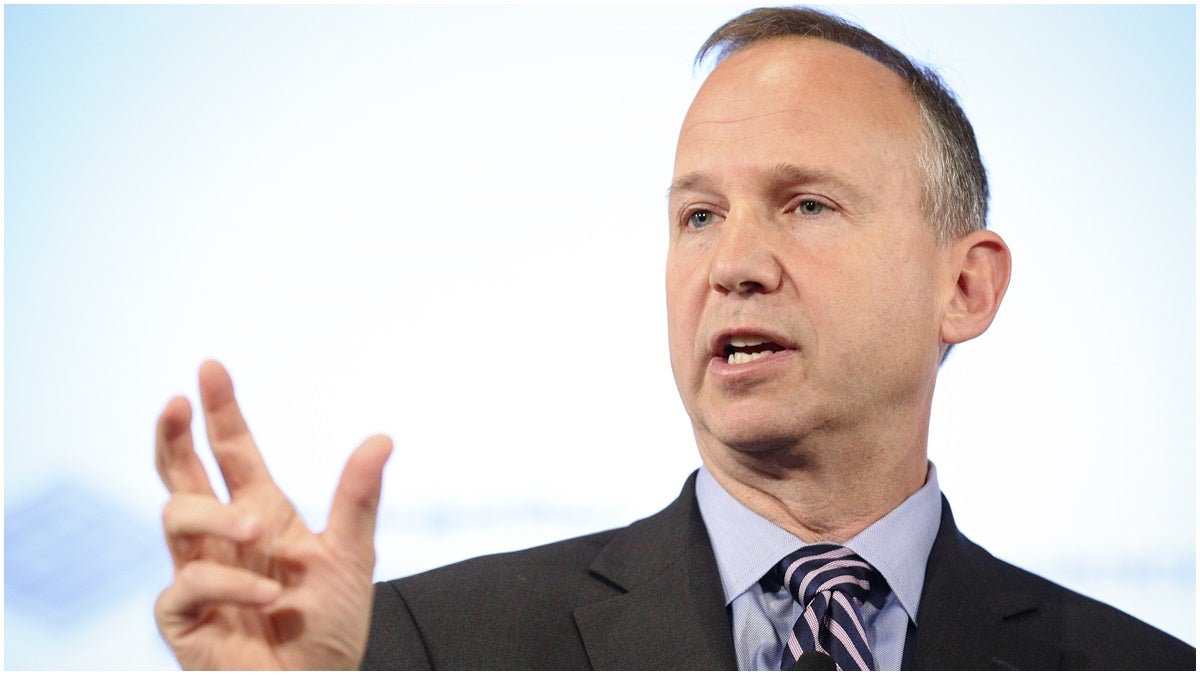Outgoing Delaware governor introduces recommended budget

(John Minchillo/AP Images for Bank of America)
Gov. Jack Markell announced a $4.1 billion dollar recommended budget on Thursday.
If approved, the budget would create a 1.09 percentage point growth. It is the governor’s final recommendation before leaving office next week. The document recommended several cuts to various programs and additional revenue sources to address a $350 million deficit.
According to tradition, incoming Governor John Carney, D-Delaware, will have a chance to suggest changes in the spring.
The administration said there is more than $149 million in cost drivers contributing to the looming deficit for fiscal year 2018. One of the largest expenses is public education at $28 million, largely due to the growing number of public school students and increases in special education.
Among education costs in the recommended budget is $7.5 million for the Wilmington Education Improvement Commission to make recommendations in future years.
WEIC is a 23-member commission, appointed by Markell, as a solution to improve low-performing, low-income schools. The group has suggested a controversial redistricting plan that would remove Christina School District from Wilmington and hand over its students to the Red Clay Consolidated School District.
Other large cost drivers in the state include personnel costs, like basic pension with about a 2 percent increase, and Medicaid, which is increasing about 3.3 percent in funds.
Another significant cost is medical services at the Department of Corrections, which will serve and treat an additional 100 inmates with Hepatitis C. The administration said cost per treatment is $52,000.
The governor’s recommended revenue changes to address the deficit adds up to $212 million at 98 percent. He’s also recommending more than $137 million in reductions.
One of the most significant cuts to state agencies is the health department’s prescription drug assistance program, which helps Medicare users pay for drugs their insurance won’t cover. Markell’s administration said the Affordable Care Act addressed much of the issue the program was created to solve.
The state also would hand its funding responsibilities over to local governments if Markell’s recommendations are approved.
The state currently pays 90 percent of the costs associated with the transportation of school students, while local school districts pay 10 percent. Markell suggested making costs a 70/30 split with school districts.
The state currently funds a maximum of 80 percent and a minimum of 60 percent on public school construction, with the exception of state special schools which receive 100 percent of its funding from the state. Markell recommended changing the ratio to 50 percent from the state and 50 percent from the local district for all capital projects issued a certificate of necessity on or after July 1 of this year. The state would still be responsible for 100 percent of the funding for state special schools.
The state also would elminate its contribution to the statewide paramedic program, which is currently at 30 percent.
The governor also recommended various cuts to benefits, including to the property tax subsidy that allows seniors 65 and older to get a property tax credit. The proposal would eliminate the subsidy in the future, creating a savings of $25.2 million.
There’s also a significant cut to state employee and retiree health plans by introducing a consumer driven healthcare plan with a health savings account, implementing and increasing deductibles, eliminating the health insurance premium preference for two state employees who are married and eliminating the contribution inequity for pensioners on the Special Medicfill Plan. The administration said these changes would save $24 million in the budget.
State employees without a deductible would see an addition of $500 for individuals and $1,000 for families, while those who already have a deductible will see an increase of the same amount.
The governor suggested several tax changes for the state to increase its revenues.
The largest corporate taxpayers would see an increase, establishing a new top rate of $250,000 with a $750 million or more of reported revenues or assets.
An individual’s itemized deductions would be limited to their federal tax return to allow for simplicity, while the standard deduction also would increase by 50 percent. The recommendations also included raising the top rate for individuals from 6.6 percent to 6.8 percent at $60,000.
Age qualifications for the pension deduction and extra personal credit also would be pushed back from 60 to 65. This would have no impact on the coming fiscal year, but would set the state up for the future.
There would also be changes to the realty transfer tax, increasing state revenues by a percentage point. This means counties and cities would lose a quarter percent of its own revenues. The administration said this would create an additional $11 million for the state.
The cigarette tax in Delaware also would increase by a dollar, but would still keep the state competitive with its neighbors.
WHYY is your source for fact-based, in-depth journalism and information. As a nonprofit organization, we rely on financial support from readers like you. Please give today.





